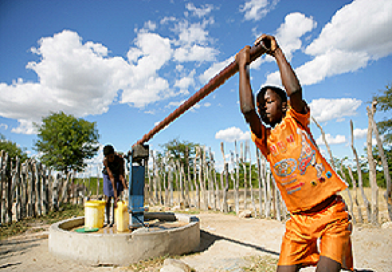Water, sanitation and hygiene (WASH)
Water, sanitation and hygiene (WASH)
Any person in any place has the right to have access to safe and sufficient water. Access to sanitation facilities, waste management and promotion of appropriate hygiene practices are essential to reduce exposure to public health threats.
MISE seeks to save lives and uphold rights (to a sufficient quantity of clean water for personal and domestic uses) by providing emergency WASH solutions to meet both immediate and temporary needs and the facilitation of durable solutions.
MISE also seeks to promote access to key institutions and services through provision of WASH facilities. In particular, MISE works to promote enrolment and attendance in education services through provision of safe water and sanitation to schools and other education facilities.
Principles
MISE’s WASH activities are conducted according to the principles that:
- Response should include health promotion activities considering and reflecting the wider cultural, social and economic aspects of hygiene practices, and understanding the particular role women play in influencing the health of the household.
- Facilities and/or infrastructure should be sex-segregated where appropriate, physically accessible within or in the immediate vicinity of the household, an educational institution or another communal institution, and ensure a location that provides the best possible security to individuals.
- The principles of Universal Design Solutions should be applied, thus caring for persons with disabilities.
- Construction and use of materials should be environmentally sensitive and water usage and disposal should be undertaken in a manner that is sustainable.
- Activities should benefit the local economy in the given situation and strengthen local competence, capacity, and self-reliance.
- Activities should strengthen social and economic links and support conflict resolution.
- Activities should mobilise communities, strengthen local management structures, and support good governance
Scope
MISE’s WASH activities focus on the provision of access to a sufficient quantity of safe water, as well as the provision of contextually appropriate sanitation and hygiene services.
Hygiene promotion should be addressed in all WASH programmes. The complexity of the situation and staff capacity will determine whether health promotion should be addressed by WASH staff or by other MISEprogramme staff.
MISE will respond to WASH needs in different phases of crisis and emergency. The phases and their corresponding activities are:
Acute Emergencies:
- MISE will focus on ensuring accessto safe and sufficient water supply, according to international emergency standards; the provision of basic household waste disposal (latrines) and critical hygiene solutions to prevent outbreaks of communicable diseases.
Chronic and Protracted crisis:
- MISE will provide WASH facilities and hygiene support to promote public health and enhance livelihood options. Special emphasis will be placed on inter-communal relations with regard to exploitation of water sources.
Early Recovery/Durable Solutions:
MISE will contribute to sustainable solutions that promote voluntary and sustainable durable solutions and can integrate into communal or public infrastructure and services.
For each phase, a wide range of technical and social solutions can be applied depending on the context. This analysis considers factors like scale, climate, local materials and skills, land and water source ownership patterns, logistics, funding, political constraints and coordination policies.
The different activities may include:
- Material or cash/voucher distribution
- Construction activities
- Capacity development
- Awareness raising
- Advocacy for access to secure water and sanitation solutions
Approach
MISE’s WASH activities shall be inclusive and participatory.
MISE’s approach is:
- To coordinate and implement activities within national guidelines/regulations where possible.
- To include integrated water resource management and water efficiency plans in programme design.
- To use locally appropriate standards and guidelines to establish water quality standards (National, WHO, SPHERE).
- To mobilize and organize communities in development of water sources, sanitation and in promoting hygiene.
- To monitor hygiene practices to ensure messages are understood and applied.
- To use local labour, goods, materials, and services as far as possible.
- To support local production of WASH construction components (supporting small local enterprises to ensure sustainable supplies).
- To include management and financing plans (structures, fees, models) for recurrent maintenance and sustainable and equitable access of WASH services.




